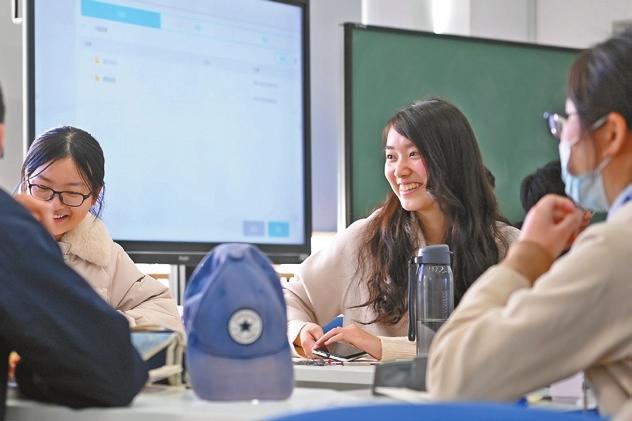

He Weiguang, Tang Yuxi hwgpaper@163.com IN China’s tech hub Shenzhen, the teaching of ideological and political theory classes has seen a revolutionary transformation, thanks to the rapid adoption of cutting-edge technology. At Shenzhen University, the advent of smart classrooms has redefined traditional teaching methodologies. By simply touching the smart podium’s screen, teachers can access a wealth of educational content. An advanced intelligent system captures their gestures and speech, translating them into clear, engaging teaching instructions and case studies for the students. Equipped with smart devices, students can actively participate in discussions, even engaging with virtual historical figures, making classes more interactive and immersive. This innovation in education is part of a broader initiative by the Shenzhen city government to prioritize the development of artificial intelligence (AI), particularly in the educational sector. An action plan the city has released recently underscores the emphasis on AI to transform education, highlighting AI education showrooms and knowledge graph-assisted teaching as future development directions. Thanks to AI, ideological and political theory courses at universities in Shenzhen are experiencing unprecedented vitality and vigor, offering students a unique and compelling learning experience. Smart classrooms With the construction of smart campuses gaining momentum in China, several universities in Shenzhen have developed diverse and intelligent classrooms, such as dual-screen smart classrooms and large-discussion rooms equipped with multiple screens, facilitating a more personalized and interactive teaching environment for ideological and political courses. Shenzhen University, in particular, has committed significant resources to establishing an interconnected “smart campus.” To date, 106 smart classrooms featuring remote interaction and virtual reality technologies have been established, with an additional 200 planned over the next three years to further enhance the university’s teaching facilities. The extensive use of these smart classrooms has not only improved the physical infrastructure, but also profoundly impacted the methodologies employed in teaching ideological and political theory. With the support of these smart classrooms and intelligent teaching resources, teachers at universities in Shenzhen now leverage big data analytics and AI for personalized, adaptive teaching that enriches the content and delivery of ideological and political theory courses. According to faculty members, these technological tools not only boost teaching effectiveness but also inspire them to explore more innovative teaching strategies. The availability of smart classrooms and intelligent resources supports the creation of dynamic and engaging class environments, promoting a culture of innovation among teachers, said a young teacher at Shenzhen University. Vivid learning experiences Driven by the desire to transform theoretical instruction into a dynamic learning experience, some teachers are incorporating the latest AI technology into their pedagogy. Advanced algorithms allow them to tailor the learning journey to individual students’ preferences, backgrounds, and learning habits, ensuring a personal and effective study path in ideological and political theory. The system will intelligently recommend relevant course contents that align with students’ needs, ensuring that each student follows the most suitable learning trajectory for them. As students proceed, AI will continue to monitor their progress, adjusting learning content and difficulty to maximize effectiveness. This personalized teaching method not only improves learning efficiency, but also enables students to experience unprecedented challenges and a sense of achievement. The adoption of virtual reality (VR) technology transports students to historical events. By wearing VR headsets, students feel as if they are present in historical scenes, interacting in real time with historical figures. This immersive learning experience not only boosts interest in learning ideological and political courses, but also provides students with a deeper understanding and insight into historical events. Throughout the learning process, AI will analyze students’ emotional and cognitive states, providing teachers with insights into their students’ learning experiences and enabling them to adjust their teaching strategies to improve effectiveness. Many students who have taken these courses have described the teaching as novel and interesting, aligning well with the interests of young people, and making learning more appealing. Efficient skill enhancement Beyond theoretical knowledge, some Shenzhen universities are also innovating in the realm of experimental teaching in ideological and political theory courses. Shenzhen University, for example, has embraced intelligent technology to create a new platform for experimental learning, employing an intelligent situational simulation system that allows students to engage with real-world problems in a virtual environment. This approach not only deepens students’ theoretical understanding, but also sharpens their critical thinking and problem-solving skills. Feedback and surveys indicate a significant increase in student satisfaction, with over 90% of participants reporting a deeper interest in and understanding of ideological and political theory, along with an improved ability to apply what they’ve learned to real-life situations. Another young teacher at Shenzhen University has noted that AI-enhanced teaching not only fosters deep reflection among students, but also strengthens their identification with and achievement in the ideological and political theory courses. This aligns with the national strategy of leveraging information technology to reform and innovate university education, enhancing the overall educational impact and receiving wide acclaim from students, she said. Promising innovation The use of AI in ideological and political theory courses at Shenzhen universities has garnered recognition and accolades from various sectors of society, demonstrating the success of these innovative methods. Currently, the development of new productive forces is a key national strategy in China. Therefore, the embrace of AI in ideological and political theory teaching at universities not only enhances the attractiveness and effectiveness of education, but also represents an essential initiative in the education sector to support the development of new productive forces. (The authors are teachers at the College of Social Sciences, Shenzhen University) | 
